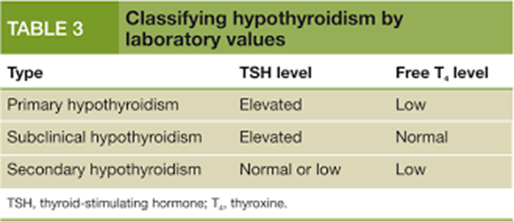A nurse in a clinic is reviewing the laboratory values of a client who has primary hypothyroidism.
Which of the following laboratory values should the nurse anticipate an elevation of?
Free T4
Serum T3
Serum T4
Thyroid stimulating hormone (TSH)
The Correct Answer is D
A. In primary hypothyroidism, the thyroid gland fails to produce sufficient thyroid hormone.
Consequently, free T4 levels are typically decreased.
B. Although serum T3 levels may also decrease in primary hypothyroidism due to impaired thyroid function, TSH is the primary marker used for diagnosis and monitoring.
C. Similarly, serum T4 levels may decrease in primary hypothyroidism due to decreased synthesis by the thyroid gland.
D. In primary hypothyroidism, the anterior pituitary gland releases more TSH to stimulate the thyroid gland to produce thyroid hormones. Therefore, elevated TSH levels are characteristic of primary hypothyroidism.

Nursing Test Bank
Naxlex Comprehensive Predictor Exams
Related Questions
Correct Answer is B
Explanation
A. Normal calcium levels are not indicative of hypoparathyroidism.
B. A manifestation of hypoparathyroidism would be a high phosphate level due to the low production of parathyroid hormone, which is responsible for regulating calcium and phosphate levels. It leads to reduced phosphate excretion.
C. Low magnesium levels are not indicative of hypoparathyroidism.
D. Normal vitamin D levels are not indicative of hypoparathyroidism.
Correct Answer is A
Explanation
A. Creatinine levels rise in acute kidney injury due to impaired kidney function, as the kidneys are unable to effectively filter creatinine from the blood.
B. BUN (blood urea nitrogen) levels typically increase in dehydration due to reduced kidney perfusion, leading to decreased urine output and increased concentration of waste products in the blood.
C. Specific gravity increases in hypovolemia because urine becomes more concentrated as the body tries to conserve water.
D. Potassium levels may vary depending on the cause of polyuria, but polyuria itself does not necessarily cause hyperkalemia. It can be caused by various factors including diabetes insipidus or diabetes mellitus.
Whether you are a student looking to ace your exams or a practicing nurse seeking to enhance your expertise , our nursing education contents will empower you with the confidence and competence to make a difference in the lives of patients and become a respected leader in the healthcare field.
Visit Naxlex, invest in your future and unlock endless possibilities with our unparalleled nursing education contents today
Report Wrong Answer on the Current Question
Do you disagree with the answer? If yes, what is your expected answer? Explain.
Kindly be descriptive with the issue you are facing.
